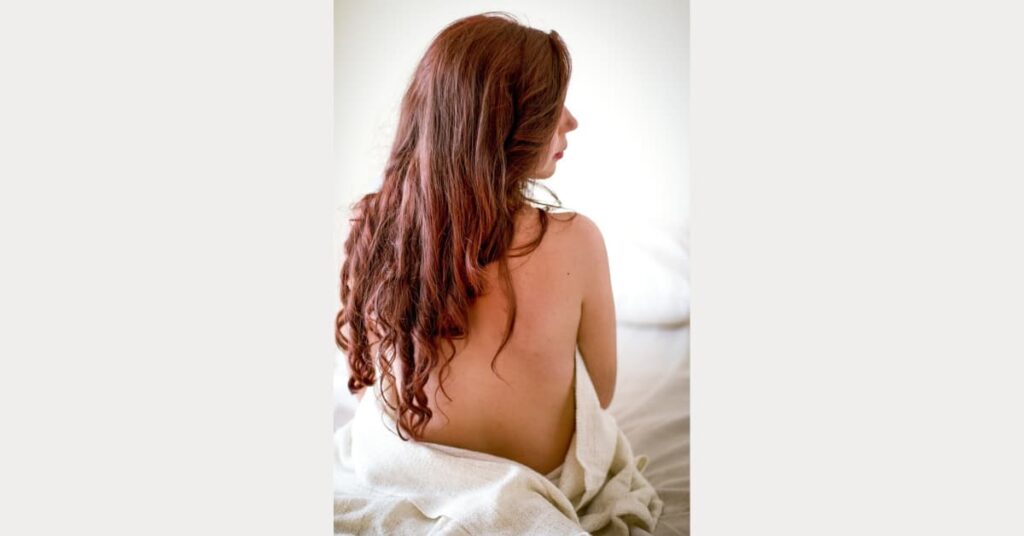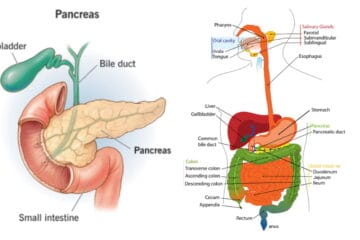Table of Contents
Introduction
Chin hair is common for men and women, often linked to hormonal fluctuations and genetics. While occasional chin hairs are normal, a sudden or excessive increase in growth could indicate an underlying medical condition, particularly in women.
Testosterone can cause chin and neck hair in people of all sexes. However, chin hair growth in females may indicate an underlying condition or issue, such as a hormone imbalance.
Hirsutism (HUR-soot-iz-um) is a situation in women that results in excessive dark or coarse hair growth in a male-like pattern — face, chest, and back.
Chin Hair
Hair is a distinct part of our uniqueness, like our skin and eye color. Some of us have much hair than others, including facial hair. A complex interplay of genetics & hormones decides the type, amount, & even how hair grows.
Some random hairs on the chin & neck popping up along with peach fuzz are routine and often related to the hormonal changes our body cycles through over our lifetime.
Sometimes, chin or neck hair is more than irritating. It might be a sign of an underlying medical condition.
Let’s examine why we get chin and neck hair and the best ways to handle it.

Chin Hair in Women
Hirsutism is excess hair, most often noticeable around the mouth and chin.
With hirsutism, extra hair growth often arises from excess male hormones (androgens), primarily testosterone.
Self-care methods and effective treatment options are available for women who wish to treat hirsutism.
It’s a common experience: Discovering hair or several other things where you aren’t expecting them. Sometimes, the discovery is a cause or reason for celebration or laughter. Other times, you can find yourself greeting some new hair with dismay or disappointment, straight-up confusion, or a pair of pincers or tweezers.
Some women find hair on their chin or jawline particularly upsetting. Despite being a typical result of the hormonal changes we experience throughout our lives, some cultures associate facial hair growth with masculinity.
What many view as a simple stray whisker can devastate others’ self-identities & self-concepts, & occupy big chunks of their daily lives. A 2006 study found that females living with facial hair reported high levels of anxiety & depression and spent, on average, approximately. 104 minutes on facial hair removal & maintenance every week.
To further complicate the talk of facial hair in females, facial hair is not a uniform characteristic. Some individuals are naturally hairier than others. That means one person’s “normal” hair growth & pattern may be a symptom of a health problem in another.

Chin hair in women causes
To tackle this hairy issue, a few definitions are in order:
- Vellus hairs: The fine hairs we usually call “peach fuzz.” We all have vellus hairs on our faces & bodies, though the quantity & location differ from individual to individual.
- Terminal hair: The thicker, longer, darker, & more deeply rooted hair that makes up the eyelashes, eyebrows, & head hair.
Hormone changes like those we all experience during puberty may turn vellus hair into terminal hair. During puberty, our bodies produce more hormones, specifically, more androgens (sex hormones).
Moreover, due to our biological sex, we all see some of the vellus hair turn into terminal hair in what are known as androgen-dependent areas of your body: places like underarms & around the genitals. As androgen levels go up, so does the amount of face and body hair you develop. You can also grow hair in more places, including the knuckles, back, buttocks, stomach, and chest — areas typically associated with men.
When the hormone levels fluctuate, the amount and kind of hair on the body can change. For women, those hormone fluctuations occur throughout their lives, including during puberty, pregnancy, and menopause. This is not only normal, but it’s a good thing.
So, you may find a new hair or two on your chin that you have never had before. You can also see that the amount of some new hair you have goes well beyond one or two new strands. If you’re experiencing thick, new, coarse hair anywhere on the face or body, this typically falls into one of two categories or sections:
- Hirsutism is defined as excessive hairs growth due to a hormonal imbalance, especially the overproduction of androgen hormones. However, it is possible that it can be identified with idiopathic hirsutism. It’s a fancy way of telling you don’t have the other symptoms or signs of a hormone imbalance, so you don’t know what’s causing it.
- Hypertrichosis is excessive hair growth that isn’t attributable to a hormone imbalance & could be due to other health conditions or medication side effects.
There are different reasons this could be happening, whether it’s a few new hairs or distinctly more than just a few. We’ve collated several of the most common reasons for facial hair in women below:
1. Aging
For women, hair growth on the chin & jawline can be a part of aging. The hormonal changes that accompany menopause impact the head & body hair. While it may be harsh, it’s not unusual to feel the texture of the head hair change — & even notice hair loss — while the upper lip and jawline start to get fuzzy. If these changes happen quickly, they might cause concern and a medical evaluation.
2. Hormone imbalance
A large proportion of the people who complain about chin hair do so as part of a larger, seemingly opposite concern caused by a hormone imbalance: scalp hair loss. That’s because when your body produces too many androgens, such as testosterone, it will cause hair loss and growth on your face.
3. Polycystic ovary syndrome (PCOS)
Polycystic ovary syndrome PCOS is one of the conditions that may run in families. What we know for sure is that it’s a prevalent endocrine condition: Some where between 5% & 15% of women of reproductive age have this condition, which guide to a wide range of complications from irregular periods & acne to a considerably elevated risk of Type 2 diabetes.
PCOS disrupts the endocrine system, creating an overproduction of androgens. That hormone imbalance may lead to hair growth in androgen-dependent areas of the body & scalp hair loss. It’s one of the most common reasons for hirsutism, with severe cases often causing women to develop full beards.
4. Heritage
Sometimes, the reason you’ve got a bit more hair on the face than other people comes down to the family tree. Some people inherit physiological traits connected with a geographic location or ethnic group. For example, hirsutism is most common in individuals of Southeast Asian, Mediterranean, & Middle Eastern descent and less common in Native American and East Asian women.
5. Diabetes
While we don’t know precisely why, there’s a clear correlation between insulin resistance & hyperandrogenism, even in individuals who don’t have PCOS. It’s not unusual for women with diabetes to notice growth in body and facial hair while the hair on their head is thinning.
6. Cushing syndrome
Excessive hair growth — on the face and other areas — is a common symptom of a rare condition called Cushing syndrome. People with Cushing’s have too much cortisol in their bodies, either because their bodies produce too much of the hormone or as a side effect of a medication.
7. Late-onset congenital adrenal hyperplasia
“Congenital adrenal hyperplasia” is an umbrella term for various adrenal gland disorders. Some people are born with these conditions, while others experience them later in life.
8. Significant weight gain or loss
When you lose or gain significant weight faster, it messes with your hormones. The resulting imbalance often increases facial hair. Some individuals with eating disorders such as anorexia nervosa & bulimia nervosa develop lanugo, the fine hair that covers fetuses in the uterus.
9. Medications
Several medications cause hair growth as a side effect, including anabolic steroids, as well as specific types of chemotherapy & epilepsy treatments.

PCOS Chin Hair
PCOS chin hair, known as hirsutism, is caused by excess male hormones (androgens) due to Polycystic Ovary Syndrome (PCOS). It leads to dark, coarse hair growth in a male-like facial and body pattern. Treatment involves lifestyle changes, medical therapies like anti-androgen medications or combined oral contraceptive pills, and hair removal methods such as laser hair removal, waxing, and shaving.
Causes
- Hormonal Imbalance: PCOS involves an overproduction of androgens (male hormones like testosterone), which stimulates hair follicles, causing vellus hairs (fine, light hair) to turn into thicker, darker terminal hairs.
- Insulin Resistance: Elevated insulin levels, common in PCOS, can also increase androgen production, intensifying hirsutism.
- Genetic Factors: Genetic predispositions can make some women more susceptible to hirsutism.

Treatment
1. Medical Treatments:
- Combined Oral Contraceptive Pills: These are often prescribed to help regulate hormone levels and treat excessive hair growth.
- Anti-Androgen Medications: These drugs can be prescribed to block the effects of androgens, reducing hair growth.
- Eflornithine Cream: A topical cream that can slow unwanted facial hair growth.
2. Hair Removal Methods:
- Laser Hair Removal: Effectively targets hair follicles to decrease growth & may provide long-lasting results.
- Shaving, Waxing, Threading: Temporary removal methods.
- Plucking: Another temporary option.
3. Lifestyle and Natural Remedies:
- Weight Management: Losing excess weight can help balance hormones and improve symptoms.
- Diet and workout: A healthy diet and regular physical activity can assist manage insulin levels and inflammation.
- Spearmint Tea: This tea has been shown to have anti-androgen effects and may help manage facial hair growth.
- Inositol: A supplement that may assist in reducing insulin resistance and androgen levels.
When to See a Doctor
- If you experience unknown hair growth, it is essential to consult or appoint a doctor to determine the underlying cause & rule out other conditions, such as thyroid or adrenal issues.
Conclusion
Chin hair is common for men and women, often linked to hormonal fluctuations and genetics. While occasional chin hairs are normal, a sudden or excessive increase in growth could indicate an underlying medical condition, particularly in women. Hirsutism is excess hair, most often noticeable around the mouth and chin. With hirsutism, extra hair growth often arises from excess male hormones (androgens), primarily testosterone. Self-care methods and effective treatment options are available for women who wish to treat hirsutism.




